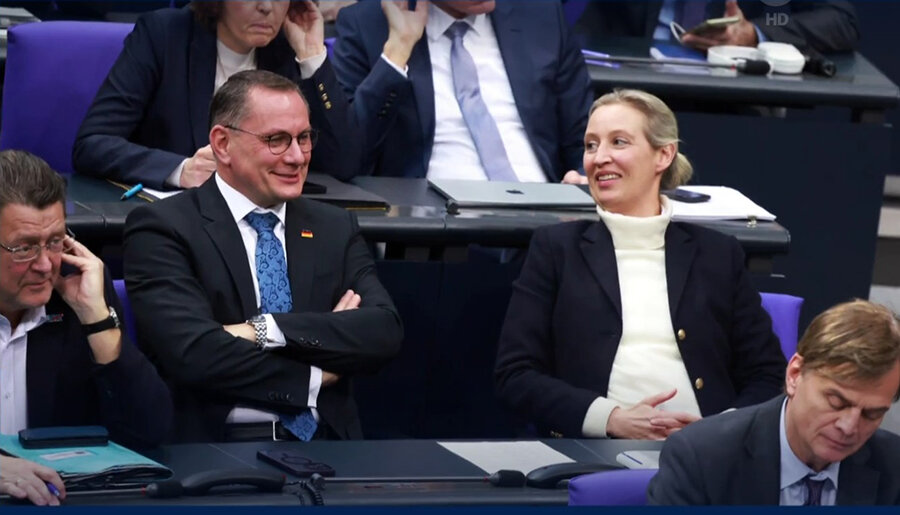read also
 Turkey sets February 2026 rent increase cap
Turkey sets February 2026 rent increase cap
 Mortgage Rule Overhaul Reshapes Türkiye’s Housing Market
Mortgage Rule Overhaul Reshapes Türkiye’s Housing Market
 Foreign Home Sales in Türkiye Hit Nine-Year Low
Foreign Home Sales in Türkiye Hit Nine-Year Low
 UK Enforces Mandatory ETA for Visa-Free Travel
UK Enforces Mandatory ETA for Visa-Free Travel
 European Airports Warn Against Suspending EU–Qatar Air Deal
European Airports Warn Against Suspending EU–Qatar Air Deal
 Widespread Flight Delays Hit Major Middle East Hubs
Widespread Flight Delays Hit Major Middle East Hubs
Germany Proposes Permanent Border Control and Entry Ban for Refugees

On January 29, 2025, the Bundestag approved a proposal to tighten Germany’s immigration policy. The measures include a de facto ban on foreigners without valid entry documents, a permanent, full-scale border control system, and stricter deportation rules, according to Tagesschau. However, the initiative remains a proposal and does not yet have legal force.
CDU leader Friedrich Merz, the likely next Chancellor of Germany, introduced two draft laws to the Bundestag. One of them focused on increasing rejections of asylum seekers at the German border. The vote breakdown was as follows:
✔️ 187 MPs from CDU/CSU supported the proposal
✔️ 75 MPs from AfD (far-right Alternative for Germany) voted in favor
✔️ 80 MPs from FDP (Free Democratic Party) also backed the plan
❌ SPD (Social Democratic Party), the Greens, and left-wing parties opposed it
What’s in the CDU’s Proposal?
The proposal outlines five key measures:
1️⃣ Permanent border control with all neighboring countries.
2️⃣ A ban on entry into Germany without a valid travel document, including refugees. The justification is that neighboring European countries are safe for asylum seekers, meaning they should not travel further into Germany.
3️⃣ Detention of individuals who are obliged to leave the country while awaiting deportation. These individuals could be held in military barracks or containers until they are deported. Deportations should take place daily, including to Afghanistan and Syria.
4️⃣ The federal government must support German states in enforcing deportations. The federal police would be granted the authority to request arrest warrants for individuals subject to deportation.
5️⃣ Convicted criminals and individuals classified as dangerous who have been ordered to leave Germany must remain in detention centers until they either voluntarily depart or are forcibly deported.
The CDU proposal was brought forward following a terrorist attack in Aschaffenburg (Bavaria), where a 28-year-old Afghan asylum seeker stabbed two people in a park, including a two-year-old child. While the reaction to the attack is understandable, experts express concern over the CDU's willingness to cooperate with the far-right AfD to push this policy forward.
AfD’s Role and Political Controversy
The Alternative for Germany (AfD) has close ties to neo-Nazi groups and has openly advocated for ‘re-migration’ policies, which could affect over 25% of Germany’s population, including naturalized citizens. The German Supreme Court is currently reviewing whether AfD’s policies violate constitutional and democratic principles.
Previously, mainstream parties refused to collaborate with AfD, implementing a political "firewall" (Brandmauer) to isolate them from decision-making. However, this tradition was broken when the CDU engaged with AfD on this immigration proposal. The move sparked protests across German cities and drew criticism from former CDU leader and ex-Chancellor Angela Merkel.
Facing public backlash, some MPs who initially supported the CDU proposal refused to vote for additional security powers in a follow-up session on January 31. Nevertheless, the core immigration restrictions were approved, though they are not yet legally binding.
Legal and Political Implications
Experts warn that some provisions in the five-point plan may violate international and EU asylum laws. Additionally, the CDU's shift toward harsher immigration controls comes as Germany prepares for federal elections on February 23, 2025.
? Election Polls:
✔️ CDU leads with 30%
✔️ AfD follows with 21%
✔️ SPD trails at 15%
✔️ The Greens hold 13%
If CDU wins, they will need to form a coalition, likely with SPD, giving them greater leverage to push stricter immigration laws. Some CDU representatives have already stated that if they take power, they will pursue policies such as:
- Increasing financial requirements for residence permits
- Extending the residency period required for German citizenship
- Revoking dual citizenship rights for non-EU nationals
- Expanding legal grounds for stripping German citizenship
The proposal sets the tone for Germany’s potential future migration policies under a CDU-led government. Whether these measures become law depends on the election results and CDU’s willingness to continue collaborating with AfD—a decision that could reshape Germany’s political landscape and its stance on immigration for years to come.





